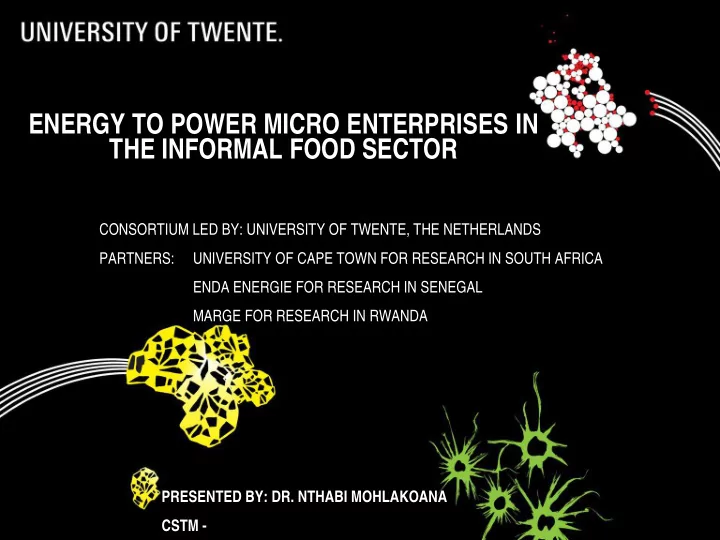

ENERGY TO POWER MICRO ENTERPRISES IN THE INFORMAL FOOD SECTOR CONSORTIUM LED BY: UNIVERSITY OF TWENTE, THE NETHERLANDS PARTNERS: UNIVERSITY OF CAPE TOWN FOR RESEARCH IN SOUTH AFRICA ENDA ENERGIE FOR RESEARCH IN SENEGAL MARGE FOR RESEARCH IN RWANDA PRESENTED BY: DR. NTHABI MOHLAKOANA CSTM -
PROJECT DESCRIPTION Part of the ENERGIA Gender and Energy Research Programme funded by DFID. Our consortium is one of five and focuses on Productive Uses of Energy in the Informal Food Sector – micro enterprises. Countries: Rwanda, Senegal and South Africa – Informal sector a ‘hot’ topic in developing countries but difficulties with addressing the IFS. Important topic for energy access and use, gender, policy and regulation, economic development, employment In most developing countries, it a sector with strong involvement of women Engendering the Energy Transition Symposium 2 University of Twente 23-24 Nov. 2016
Engendering the Energy Transition Symposium 16/1/17 3 University of Twente 23-24 Nov. 2016
Engendering the Energy Transition Symposium 16/1/17 4 University of Twente 23-24 Nov. 2016
Elec. gas Engendering the Energy Transition Symposium 5 University of Twente 23-24 Nov. 2016
METHODOLOGY Semi-structured questionnaire (surveys) – 180 enterprises In-depth interviews – 15 enterprises Focus group discussions Document analysis (for literature review and to inform about stakeholders) Key informants / Stakeholders Engendering the Energy Transition Symposium 6 University of Twente 23-24 Nov. 2016
IFS MICRO-ENTERPRISE ENERGY USE POINTS FROM LITERATURE Majority of IFS owners and operators are women Energy use is critical for the IFS not only for productive uses but for welfare and strategic needs (Skutsch 2005) There is need to update literature (& build concrete evidence) on whether energy access and use benefits women and men differently in the IFS – Most based on assumptions – lack of follow-up on pilots Lack of documentation on negative impacts of switching from traditional to modern Certain energy sources are specifically chosen (regardless tradition or modern) because their benefits – i.e. food flavour, speed Engendering the Energy Transition Symposium 7 University of Twente 23-24 Nov. 2016
IFS MICRO-ENTERPRISE ENERGY USE POINTS FROM OUR DATA Our study found that micro enterprises use multiple energy sources Energy ladder concept as transition does not hold true in this sector Energy stacking – movement between traditional and modern energy - is much more realistic BUT depends on variety of factors. Factors: location, type of product prepared and sold, type of structure, affordability, customer preference, quality of product, ease of use, security of supply, stability of enterprise, Free Basic Energy Some factors are prioritised more than others therefore will have more influence Some household energy is used for the enterprise. Engendering the Energy Transition Symposium 8 University of Twente 23-24 Nov. 2016
IFS MICRO-ENTERPRISE ENERGY USE OTHER OBSERVATIONS Lack of refrigeration (and temperature control) Low use of electricity for thermal needs and MES in IFS but still important for ‘quick’ needs such as food warming, water boiling and phone charging On policy: Largely unresponsive or silent on energy but urban planning policies and by-laws typically hostile to informal businesses. Authorities’ obsession with aesthetics Energy policy silent on energy in the informal sector, particularly the IFS Engendering the Energy Transition Symposium 9 University of Twente 23-24 Nov. 2016
FROM OUR DATA… Engendering the Energy Transition Symposium 10 University of Twente 23-24 Nov. 2016
Data Analysis: Energy used & product
Data Analysis: Equipment used & product
Data Analysis: Sex of owner
Data Analysis: Gender & age of enterprise SA: 50% of male owners between 1 – 5 years whereas females spread between all categories Senegal: 44,4% of female owners more than 10 years whereas males spread between all categories Rwanda: most female and male owners less than 1 years or between 1 - 5 years. The age of enterprise is influenced by various factors such as location of enterprise, seasonality, security and trading regulations among other issues. Engendering the Energy Transition Symposium University of Twente 23-24 Nov. 2016
Data Analysis: Gender & age of enterprise
Data Analysis: Energy use & preferences Percentage of respondents’ energy Number of female respondents’ preferred energy use per country type compared to males 90% 85% 80% 73% 70% 60% 50% 40% 27% 30% 20% 15% 10% 0% Trad. Modern Male Female
Data Analysis: Energy use & preferences Type of energy used at home by female a male respondents
Data Analysis: Energy supply chain In Rwanda, most enterprises buy charcoal or wood from male suppliers (delivered to site or collected using own transport). In South Africa, it is more common to buy charcoal or gas from supermarkets and wholesalers In Senegal, wood, charcoal and gas are bought from a variety of male, female suppliers and shops 56% of all energy sources are delivered to site at no cost; 23% are collected using own transport; and only 17% are delivered at cost. Engendering the Energy Transition Symposium University of Twente 23-24 Nov. 2016
Data Analysis: Advantages and disadvantages per energy source Engendering the Energy Transition Symposium University of Twente 23-24 Nov. 2016
SOME KEY OVERALL FINDINGS… WHAT HAVE WE LEARNED? Limited literature available on women’s empowerment, modern energy services and the Informal Food Sector. Energy choices by location, type of product sold, regulations and cost, inconclusive that it’s by gender. The Informal Food Sector is absent in Energy Policy and Energy is often absent in MSME policies – Where energy is considered in MSME policy, it’s not related to gender Therefore there is a need to influence policy at different levels to highlight issues of energy use and gender in the IFS Engendering the Energy Transition Symposium 20 University of Twente 23-24 Nov. 2016
Recommend
More recommend